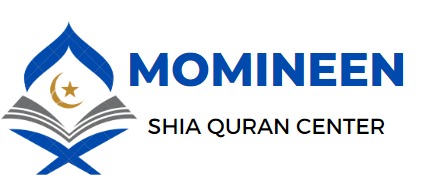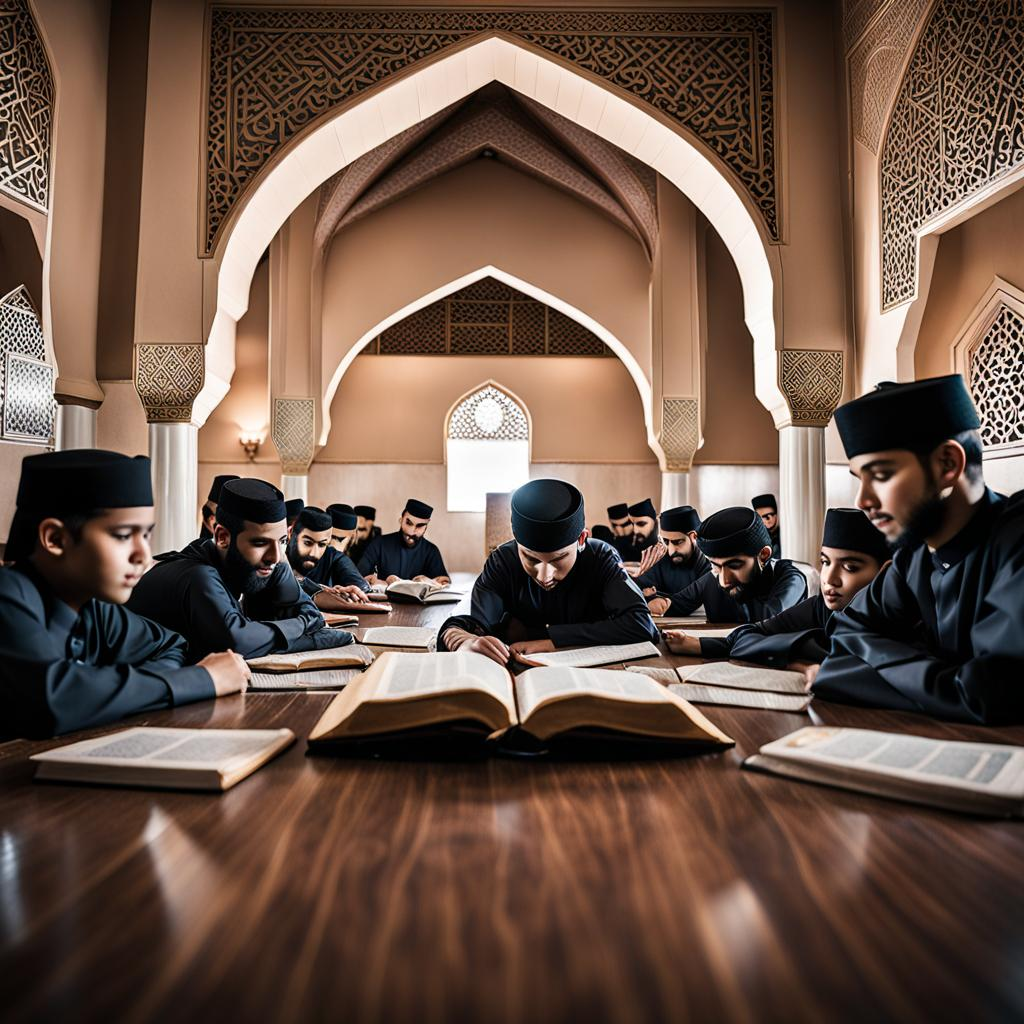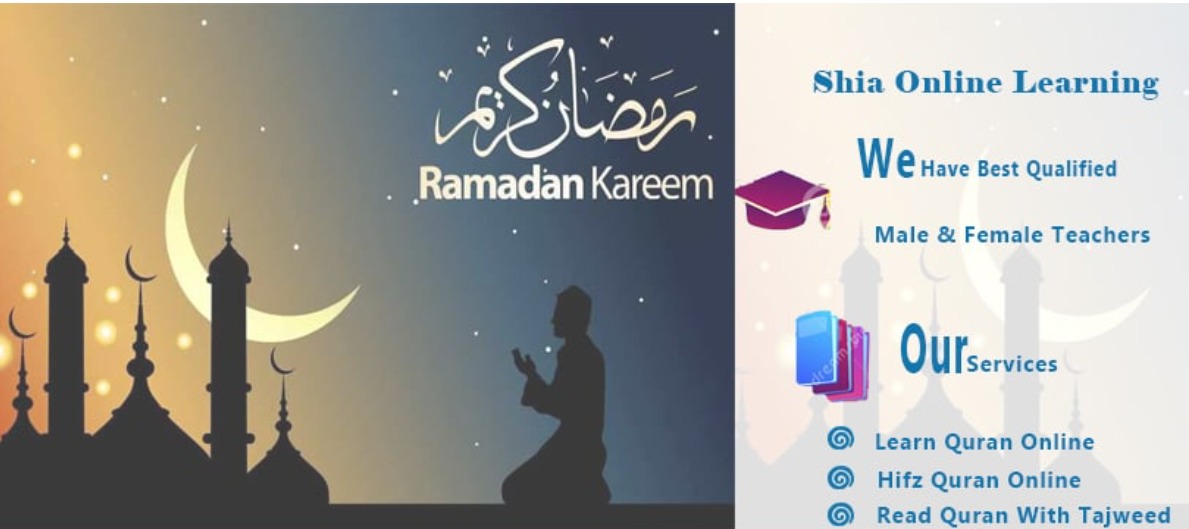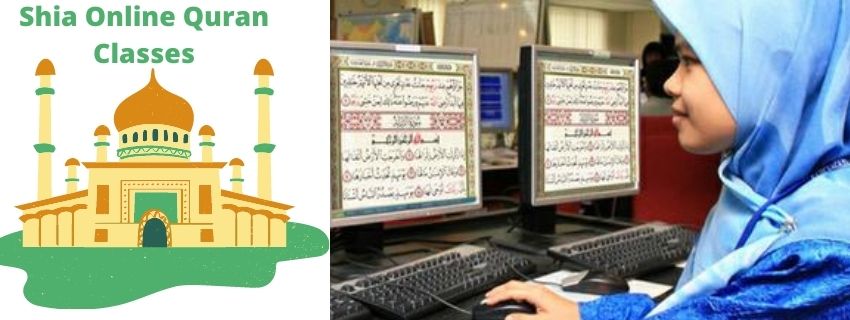The rise of the Online Shia Quran Center marks a significant transformation in the way religious education is approached within the Shia Islamic community. This article delves into the multifaceted world of digital religious learning, exploring how technological advancements and the internet have revolutionized traditional Quranic studies. From the emergence of virtual platforms to the integration of cutting-edge tools, the online Shia Quran Center is at the forefront of educational innovation, ensuring that the sacred teachings remain accessible and relevant in an increasingly digital age.
Key Takeaways
- Online Shia Quran Centers have emerged as a response to the growing need for accessible and flexible religious education in the digital era.
- Technological innovations such as interactive learning tools and virtual reality are enhancing the experience of studying the Quran online.
- Adaptations in curriculum and teaching methodologies are crucial for translating traditional teachings into formats suitable for online learning.
- Virtual platforms are not only educational spaces but also serve as communities for spiritual growth, fostering a sense of belonging among believers worldwide.
- The future of Shia Islamic education online is poised for further growth, with potential integrations of AI and a significant impact on global Shia communities.
The Emergence of Online Shia Quran Centers
Understanding the Need for Digital Platforms
In an increasingly connected world, the demand for accessible religious education has led to the rise of online Shia Quran centers. These platforms cater to a global audience, breaking geographical barriers that once limited the spread of Shia teachings. The digital transformation of religious study is not just a trend, but a necessary evolution to meet the needs of the faithful in the modern era.
- Accessibility for the disabled and those in remote areas
- Flexibility to accommodate various schedules
- Preservation and wider dissemination of Shia scholarship
The shift to online platforms ensures that the rich traditions and teachings of the Shia faith are preserved for future generations, while adapting to the changing landscape of learning.
The online Shia Quran centers are not just repositories of knowledge but are dynamic spaces for interactive learning. They provide a bridge between traditional Islamic education and contemporary learning tools, making religious studies more engaging and relevant to younger audiences.
Historical Context and Modern Adaptations
The transition to online Shia Quran centers is not merely a technological leap but also a cultural adaptation. Historically, Shia Islamic education was deeply rooted in community-centric learning, often taking place in mosques and madrasas. The digital transformation of these traditional settings reflects the evolving needs of the global Shia community.
- Traditional setting: Local mosques and madrasas
- Modern adaptation: Online platforms and virtual classrooms
- Key drivers: Accessibility, convenience, and the global dispersion of Shia Muslims
The essence of Shia education has always been the intimate teacher-student relationship, which online platforms strive to maintain despite the physical distance.
Modern adaptations have necessitated the development of new pedagogical approaches. Online Shia Quran center now offer a range of services that were previously unavailable or difficult to access, such as 24/7 access to resources, personalized learning plans, and a connection to a broader scholarly community.
Key Features of Online Shia Learning Environments
Online Shia Quran centers have revolutionized the way religious education is imparted to the global Shia community. Personalized learning experiences are at the forefront of these digital platforms, allowing students to progress at their own pace and according to their individual learning needs.
Key features of these environments include:
- Interactive multimedia content: Engaging videos, audio recitations, and graphical illustrations that enhance understanding.
- Live tutoring sessions: One-on-one or group classes with qualified instructors to guide learners through the Quranic teachings.
- Flexible scheduling: Courses and lessons that can be accessed at any time, accommodating different time zones and personal schedules.
- Language options: Services offered in multiple languages to cater to a diverse international audience.
The integration of discussion forums and chat rooms also encourages community interaction and collective learning, which is vital for spiritual growth and knowledge sharing.
These features collectively create a comprehensive and immersive learning environment that not only educates but also connects Shia Muslims worldwide.
Technological Innovations in Religious Education
Interactive Learning Tools and Resources
The advent of online Shia Quran centers has revolutionized the way religious education is imparted. Interactive learning tools and resources have become a cornerstone of this digital transformation, engaging students in ways that traditional classrooms often cannot. These tools include multimedia lectures, interactive quizzes, and real-time feedback mechanisms that cater to the diverse learning needs of students across the globe.
- Multimedia lectures enhance the understanding of complex concepts.
- Interactive quizzes provide immediate assessment and reinforce learning.
- Real-time feedback mechanisms help in tracking progress and identifying areas for improvement.
The integration of these interactive elements into religious education not only makes learning more engaging but also allows for a personalized approach, accommodating different learning styles and paces.
The use of such tools has shown a positive impact on retention and comprehension of the Quranic teachings. As students navigate through the intricacies of the Quran, these resources serve as invaluable aids, ensuring that the sacred text is both accessible and relatable to a modern audience.
The Role of Virtual Reality in Quranic Studies
The integration of Virtual Reality (VR) into Quranic studies represents a groundbreaking shift in religious education. VR technology offers immersive experiences that can transport students to historical sites and events, providing a vivid context for the teachings of the Quran. This sensory-rich environment can enhance understanding and retention of religious texts.
- Immersive reenactments of historical Islamic events
- Virtual tours of significant religious sites
- Interactive learning scenarios for deeper engagement
The use of VR in Quranic studies not only enriches the learning experience but also bridges the gap between traditional study methods and contemporary educational technologies.
The potential of VR to revolutionize Quranic education is immense, with applications ranging from detailed explorations of the Prophet’s life to virtual participation in communal prayers. As this technology becomes more accessible, it is poised to become a staple in the toolset of online Shia Quran centers.
Ensuring Accessibility and Inclusivity
Online Shia Quran Centers are revolutionizing the way religious education is accessed by breaking down traditional barriers. The emphasis on inclusivity ensures that individuals from diverse backgrounds and with varying abilities can participate in learning the Quran.
- Geographical Barriers: Learners from remote or underserved regions can now access quality religious education.
- Physical Accessibility: Features such as screen readers and voice commands support those with visual or motor impairments.
- Economic Factors: Reduced costs compared to physical centers make education more affordable.
- Cultural Sensitivity: Courses offered in multiple languages cater to non-Arabic speakers.
The goal is to create a learning environment where every student feels valued and supported, regardless of their personal circumstances.
The implementation of adaptive technologies and flexible learning schedules accommodates a wide range of learners, promoting a more equitable educational landscape. This approach not only broadens the reach of Shia Islamic teachings but also enriches the learning experience by fostering a diverse community of learners.
Curriculum and Teaching Methodologies
Adapting Traditional Teachings for the Digital Age
The transition of Shia Islamic education into the digital realm has necessitated a thoughtful adaptation of traditional teachings. Educators are now re-envisioning how to convey the timeless wisdom of the Quran while leveraging modern technology. This process involves not only the digitization of content but also the transformation of pedagogical approaches to suit online learning environments.
- Preservation of classical texts in digital formats
- Incorporation of multimedia elements to enhance understanding
- Interactive discussion forums for collaborative learning
- Regular online assessments to track progress
The essence of the Quran’s teachings remains unchanged, but the methods of delivery have evolved to meet the needs of a connected world. The goal is to make the learning experience as engaging and effective as possible, without compromising the depth and authenticity of the religious teachings.
The challenge lies in balancing respect for traditional methods with the opportunities presented by digital tools. This balance is crucial for maintaining the integrity of the teachings while making them accessible to a broader audience. As such, online Shia Quran centers are becoming pivotal in shaping the future of Islamic education.
Certification and Accreditation of Online Programs
The credibility of any educational program is significantly enhanced by its certification and accreditation status. Online Shia Quran Centers are no exception, and many have sought recognition from reputable Islamic educational bodies to ensure their programs meet rigorous academic standards. This not only helps in maintaining the integrity of the teachings but also in providing learners with qualifications that are respected within the community.
The process of accreditation involves a thorough review of the curriculum, teaching methodologies, and the qualifications of the educators. It’s a critical step that aligns online religious education with established norms and expectations.
To illustrate the importance of certification, here’s a list of benefits that accredited programs offer:
- Assurance of quality education that adheres to traditional Islamic scholarship
- Increased trust and credibility among students and the wider Muslim community
- Enhanced opportunities for graduates in religious, academic, and professional fields
- A benchmark for continuous improvement and adherence to best practices in online learning
Engaging the Youth: Modern Approaches to Ancient Texts
The digital age has ushered in innovative methods to engage younger audiences with the timeless teachings of the Quran. Interactive storytelling, gamification, and relatable analogies are proving effective in capturing the attention of the youth. These modern approaches are not only making the ancient texts more accessible but also more appealing to the digital-savvy generation.
- Interactive storytelling uses narrative techniques to bring Quranic stories to life.
- Gamification introduces elements of play to make learning more engaging.
- Relatable analogies help connect Quranic teachings to contemporary issues.
The challenge lies in balancing respect for traditional interpretations with the need for contemporary relevance. This balance is crucial to ensure that the essence of the teachings is preserved while making them understandable and applicable to young people today.
Educators are constantly exploring new pedagogies to maintain this delicate equilibrium. The success of these online Shia Quran centers in engaging the youth will likely influence the evolution of Islamic education for years to come.
Community and Spiritual Growth Online
Fostering a Virtual Ummah
The concept of Ummah, or community, is central to the Islamic faith, transcending geographical boundaries to connect believers in spiritual solidarity. Online Shia Quran Centers have revolutionized this concept, enabling the formation of a virtual Ummah that brings together Shia Muslims from around the world. Through these digital platforms, individuals can participate in communal prayers, discussions, and educational programs, fostering a sense of belonging and unity.
- Virtual gatherings for religious observances
- Discussion forums for theological discourse
- Collaborative learning sessions
The virtual Ummah is not limited by physical proximity, allowing for a diverse and inclusive community that enriches the Islamic learning experience. It serves as a testament to the adaptability of religious practices in the digital age, ensuring that the essence of communal worship and learning is preserved.
The online environment also presents unique opportunities for community engagement and spiritual growth. By participating in online forums and study groups, members can exchange ideas, support one another’s learning journeys, and deepen their understanding of the Quran and Shia teachings. The digital Ummah thus becomes a space of continuous learning and spiritual development, accessible to all who seek knowledge and connection.
Online Platforms as Spaces for Interfaith Dialogue
The advent of online Shia Quran centers has not only revolutionized the way adherents of the faith engage with their sacred texts but has also opened doors for interfaith dialogue. These platforms serve as bridges, connecting diverse religious communities through the shared pursuit of understanding and respect for spiritual teachings.
- They provide a safe space for discussion and exchange of religious perspectives.
- They encourage learning about other faiths, fostering mutual respect.
- They facilitate collaborative events, such as interfaith webinars and workshops.
The potential for these online centers to contribute to global peace and understanding is immense. By transcending physical boundaries, they allow for a continuous and dynamic exchange of ideas, nurturing a culture of empathy and coexistence.
Challenges and Opportunities in Virtual Community Building
Building a virtual community for Shia Muslims presents unique challenges and opportunities. Accessibility issues can arise, as not all members may have the necessary technology or internet proficiency. However, the online platform also offers unprecedented opportunities for inclusivity, allowing those who might be geographically isolated to participate in a global Ummah.
- Challenges:
- Technological barriers
- Maintaining religious authenticity
- Ensuring privacy and security
- Opportunities:
- Global connectivity
- 24/7 access to resources
- Innovative methods of engagement
The digital realm has the potential to revolutionize how the Shia community interacts, learns, and grows together. It’s crucial to navigate these challenges thoughtfully to fully realize the opportunities for spiritual and communal development.
The Future of Shia Islamic Education Online
Predicting Trends in E-Learning for Religious Studies
As we look to the future of Shia Islamic education online, several trends are poised to shape the landscape of e-learning for religious studies. The integration of advanced analytics and personalized learning experiences stands at the forefront, promising to tailor religious education to individual needs and learning styles.
- Increased use of mobile applications for on-the-go learning
- Greater emphasis on collaborative platforms that connect students and scholars
- Expansion of multilingual resources to cater to a global audience
The evolution of e-learning platforms will likely continue to break down geographical barriers, making Shia Islamic education more accessible to believers worldwide.
Another significant trend is the rise of gamification in religious education. By incorporating game-like elements into the learning process, online Shia Quran centers can enhance engagement and retention of knowledge among learners of all ages.
Integrating Artificial Intelligence in Quranic Education
The integration of Artificial Intelligence (AI) in Quranic education represents a transformative leap in how religious studies are approached. AI-driven analytics can personalize learning experiences, tailoring content to individual needs and pace. This technology also enables the creation of responsive learning environments that adapt to the cognitive and emotional responses of students.
- Automated translation and tafsir (interpretation) of Quranic verses
- AI tutors for language pronunciation and recitation
- Intelligent question-answering systems for theological inquiries
- Data-driven insights into learning patterns and progress
The potential of AI to revolutionize Quranic education extends beyond mere convenience. It offers a profound expansion of accessibility, allowing students from diverse backgrounds to engage with the Quran in unprecedented ways.
The use of AI in educational settings also raises important ethical considerations. Ensuring that these technologies respect the sanctity of the religious texts and the cultural nuances of Shia Islam is paramount. As such, developers and religious scholars must collaborate closely to create AI tools that are both technologically advanced and theologically sound.
The Impact of Online Learning on Global Shia Communities
The advent of online Shia Quran centers has had a profound impact on global Shia communities, transcending geographical boundaries and fostering a sense of unity among believers. Online learning has democratized access to religious education, allowing individuals from remote or underserved regions to participate in Quranic studies.
- Enhanced cross-cultural exchange and understanding
- Increased participation in religious discourse
- Greater access to diverse scholarly perspectives
The shift to digital platforms has not only made education more accessible but has also encouraged a more inclusive and expansive approach to religious scholarship.
The ripple effects of this educational revolution are evident in the increased collaboration and solidarity among Shias worldwide. Online platforms have become a catalyst for social and spiritual cohesion, paving the way for a more interconnected and supportive global community.
Embracing Tradition in the Digital Age
The rise of the Online Shia Quran Center is a testament to the resilience and adaptability of faith in the modern world. As we have explored, these centers not only provide a platform for learning and spiritual growth but also foster a sense of community among believers across the globe. The digital transformation of religious study has made the profound teachings of the Quran more accessible than ever, ensuring that the essence of Shia Islam continues to thrive and resonate with the younger, tech-savvy generation. As we move forward, it is clear that the harmonious blend of tradition and technology will continue to shape the way we understand and practice faith.
Frequently Asked Questions
What prompted the creation of Online Shia Quran Centers?
The creation of Online Shia Quran Centers was prompted by the need to provide accessible religious education to Shia Muslims around the world, especially in regions where such resources are scarce or non-existent. Additionally, the rise of digital technology and the internet has made it possible to connect learners with qualified teachers regardless of geographical barriers.
How do Online Shia Quran Centers adapt traditional teachings for the digital age?
Online Shia Quran Centers adapt traditional teachings for the digital age by utilizing modern educational tools and techniques, such as interactive software, digital whiteboards, and video conferencing, to facilitate learning. They also often offer flexible scheduling and self-paced learning to accommodate the diverse needs of their students.
What technological innovations are being used in Online Shia Quran Centers?
Technological innovations in Online Shia Quran Centers include interactive learning tools, digital resources like e-books and online libraries, virtual reality environments for immersive learning experiences, and adaptive learning platforms that tailor education to individual student needs.
Are Online Shia Quran Centers accredited, and do they offer certification?
Many Online Shia Quran Centers strive to offer accredited programs and provide certification upon completion. Accreditation varies depending on the institution and the region it operates in. It’s important for students to verify the accreditation status of the center before enrolling.
How do Online Shia Quran Centers help in building a virtual community?
Online Shia Quran Centers help in building a virtual community by offering platforms for students to interact, discuss, and engage in collective learning experiences. They often host live sessions, forums, and social media groups to foster a sense of community and spiritual growth among learners.
What is the potential future impact of Online Shia Quran Centers on global Shia communities?
The potential future impact of Online Shia Quran Centers on global Shia communities includes expanded access to religious education, enhanced understanding and practice of the faith, and the creation of a more interconnected global Shia community. The integration of advanced technologies like AI could further personalize and enhance the learning experience.





